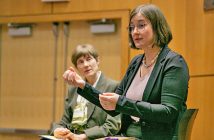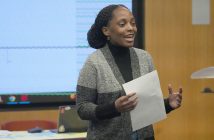Women who work and teach at Fordham staged a panel discussion on Nov. 18 to share their experiences as females at Jesuit universities.
The event, “Conversation and Solidarity: Women at Jesuit Institutions,” was held in Tognino Hall on Fordham’s Rose Hill campus as part of Ignatian Heritage Week.
When Elizabeth Johnson, C.S.J., Ph.D., Distinguished Professor of Theology, began her teaching career 18 years ago at Catholic University, she was nearly denied tenure after she published a paper on the Virgin Mary from a feminist perspective.
She eventually received tenure, she said, after a long “interrogation.”
“I eventually found myself self-censoring,” Sister Johnson said. “I thought, ‘Do I want to live life with these constraints?'”
Johnson then joined the Department of Theology at Fordham and published She Who Is: The Mystery of God in Feminist Theological Discourse (Crossroad Publishing, 2002). The award-winning volume calls for feminist language about God.
“Father [Joseph M. McShane, S.J, president of Fordham], then the dean of Fordham College at Rose Hill, was thrilled; he threw a big party for my department,” Sister Johnson recalled. “There’s no question I found academic freedom here.”
A focal point of the evening was Decree 14 of General Council 34, a document issued by the Society of Jesus in 1995 that commits “in a more formal and explicit way to regard solidarity with women as integral to our mission.”
Sister Johnson said she supports the document, but added that the goal of Decree 14 remains unfulfilled.
“There was tremendous excitement when it was approved, but I’m afraid it’s petered out,” she said.
“When Decree 14 was new, I harkened back to the Jesuits that were martyred in El Salvador in 1989 because they were helping the poor,” she said. “They took Decree 4 of General Council 32 [on social justice]seriously and were martyred. I said that if the Jesuits take Decree 14 just as seriously, there will be martyrs.
“The sad news is there aren’t any martyrs yet,” Sister Johnson said.
Carol Gibney, associate director of campus ministry at Fordham Westchester, said she has experienced personal liberation and freedom working for the Jesuits, with whom she interacts and collaborates daily.
“It hasn’t been perfect, but then again, nothing is,” Gibney said. “The goal of education here is to create social justice—men and women for others.”
Angela O’Donnell, associate director/acting co-director of the Francis and Ann Curran Center for American Catholic Studies, and Melissa Alvarenga, associate coordinator of the Service-Learning Community Service Program at Rose Hill, were also on the panel.
“My experience at Jesuit Universities has been overwhelmingly positive, but it has not been exclusively so. There have been times when I have felt excluded from the partnership we are striving for,” O’Donnell said. “I believe this exclusion is traceable, at times, to my identity as a lay person and, more specifically, as a lay women.
“Some Jesuits have had a difficult time understanding this relationship of ‘mutuality and equality.’ But such differences are to be expected in a fallen world, and these are as much a function of personality and spiritual development as they are of prejudice,” she continued. “It is precisely because of the inevitability of these imperfections that Decree 14 was written. The very existence of the document is a reminder of the injustices of our current condition and a goad to all of us in Jesuit Higher Education, male and female alike, to strive to remedy these as soon as we possibly can.”
Alvarenga said attending a Jesuit university called her to engage in service to her community, in particular the immigrant enclaves of Los Angeles. Throughout her time there, she witnessed many inspirational female leaders.
“We have to continue to discuss how we can integrate more women in the University community,” Alvarenga said. “Women are leaders.”
Ignatian Heritage Week, begun in 2000, consists of a series of programs, discussions and activities intended to help Fordham students examine the life and work of St. Ignatius of Loyola, the founder of the Society of Jesus. The events are planned by the Ignatian Society. This particular event was coordinated by Fordham College at Rose Hill sophomore Maria Fitzsimmons.


